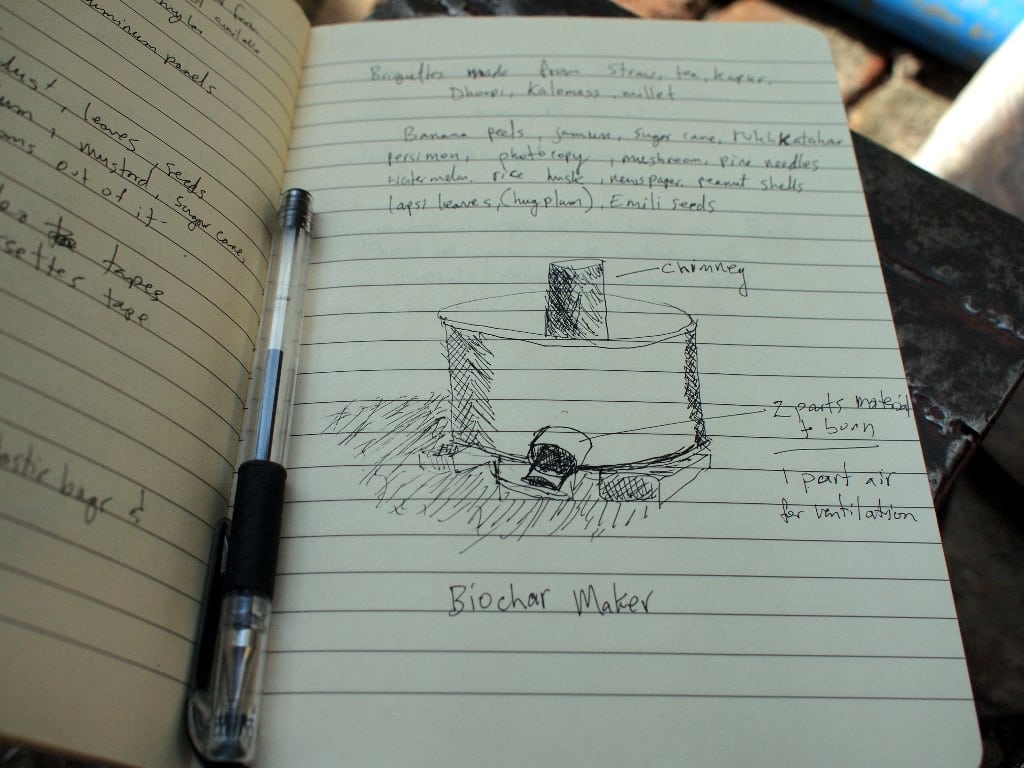Fuel briquettes little larger than hockey pucks dry on string runners in the yard of the Foundation of Sustainable Technologies in Kathmandu, Nepal. FoST lies at the end of a narrow street that slopes away from the dust, motors, bicycle rickshaws and storefronts of the city’s Thamel neighborhood. Sanu Kaji Shrestha, FoST’s founder, demonstrates and sells low-cost devices that can improve incomes and save money for Nepal’s small-plot farmers, business owners and families.
We reported on FoST’s briquettes in 2010 and we visited the facility in Kathmandu for an update. FoST, it turns out, is about much more than just fuel briquettes.
The yard is the main showcase. A simple biochar maker built from an oil drum serves to train coffee farmers. They learn to make soil-enhancing biochar from coffee cherries and husks. Nearby, a solar cooker with parabolic reflectors boils water and burns briquettes in just a few minutes of Kathmandu’s morning sun. The briquettes, on rack near the cooker, are pressed from a slurry of paper, sawdust, yard clippings and agricultural waste. They burn about three times as efficiently as those materials would burn on their own, and they smoke up to 70 percent less, according to FoST’s experiments.
Sanu also keeps a greenhouse in the yard where he grows eggplant, soybeans, tomatoes and corn. He mixed chicken manure and biochar into the soil, and the crops grow larger and more quickly than comparison crops in normal soil growing alongside. The eggplant can grow twice as large, Sanu says.
Indoors, a line of parabolic cookers and heaped briquettes against a wall make way for a conference-style table, a small kitchen and tables stacked with inventions and raw materials.
Customers try out different models of briquette makers on the floor while Sanu’s family members show handbags woven from cassette tape ribbon and serve tea and cookies.
FoST has experimented with dozens of plant materials to include in its briquettes and displays many of them in labeled jars and plastic soda bottles. Some include newsprint, sawdust, grasses, fruit peels, sugar cane, office paper, pine needles, rice husk and many others.
These pictures tell the story. And there are more photos on E4C’s Flickr album.
We accompanied Sanu to the Rejoice and Salvation in Trinity Services home for orphans, widows and their children in a village outside of Kathmandu called Jharuwarajhi. The home had recently acquired a briquette press and Sanu was curious to see how it was used.
The home perches on a hill overlooking a commercial brick firing kiln. The kiln’s chimney pokes up from the bottom of a terraced basin of earth excavations for bricks and patches planted with corn and other crops.
The residents press the fuel briquettes as part of their daily chores. When the briquettes have dried, the cooks burn them in a rocket stove or in a long, three-burner, low-smoke, efficient clay stove in the home’s kitchen. Pressing fuel briquettes saves the orphanage and home 30 percent in fuel expenses, says the home’s president, Suresh Kumar Khati.
Besides the briquette press, the home had some other new cost-saving technology, including two solar water heaters and two photovoltaic panels as supplementary power during the region’s frequent blackouts. The devices came through help from Angel Chitrakar at the community development organization Environmental Camps for Conservation Awareness. This six-minute news video shows the briquette press in action, as well as the other devices at the home: An eco-friendly orphanage in Nepal.
FoST is collecting donations to fund its community training seminars. Please visit FoST’s Web site to support this work.
And the orphanage and home also seeks donations to continue its mission. Please visit the RST Services Web site for more information.













